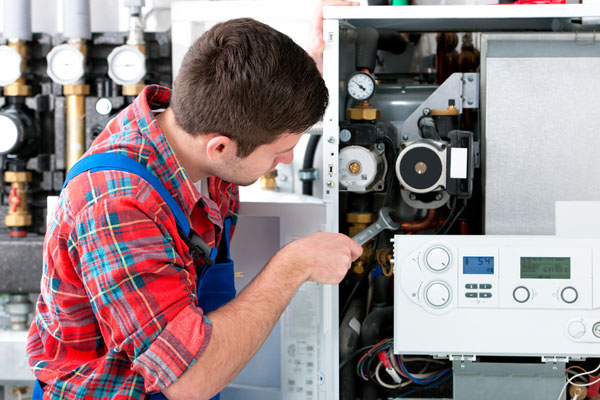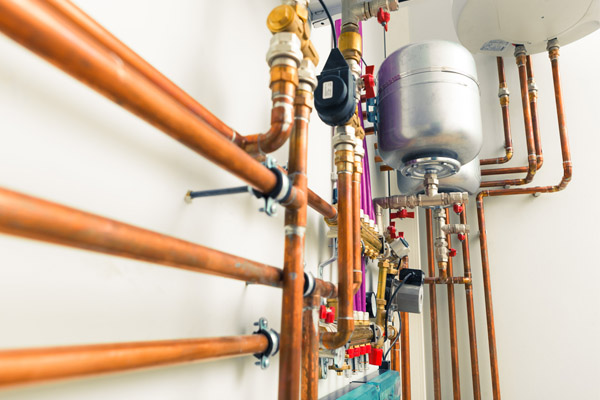What Is A Boiler Expansion Tank?

Have you ever noticed how your home stays comfortably warm, even as temperatures plummet outside, without your boiler breaking a sweat? This feat is often supported by a crucial but underappreciated device: the boiler expansion tank. At McAllister Energy, where expertise in boiler systems, installations, and maintenance is a hallmark, we recognize the significance of such components.
In this article, we delve into the mechanics and necessity of the boiler expansion tank, shedding light on its role in your heating system’s efficiency and safety. Understanding this component can help maximize the performance and extend the lifespan of your boiler.
Understanding the Boiler Expansion Tank: What It Is & Why It Matters
Contents
- 1 Understanding the Boiler Expansion Tank: What It Is & Why It Matters
- 2 Understanding the Basics of a Boiler Expansion Tank
- 3 How a Boiler Expansion Tank Works
- 4 Types of Boiler Expansion Tanks
- 5 Why Boiler Expansion Tanks Are Important
- 6 Signs Your Boiler Expansion Tank May Need Attention
- 7 How McAllister Energy Can Help
- 8 Boiler Expansion Tank: FAQs
- 9 Conclusion
- 10 Call McAllister Energy For All Of Your HVAC Requirements
A boiler expansion tank is more than just a component; it’s a crucial safeguard for your heating system. Let’s delve into how this essential device works and why it’s indispensable for maintaining boiler efficiency and safety.
Understanding the Basics of a Boiler Expansion Tank

A boiler expansion tank is a small but vital component designed to manage the pressure within a boiler’s closed-loop system. Its primary function is to accommodate water’s expansion and contraction as it heats and cools, preventing pressure-related issues such as leaks or bursts.
By absorbing excess pressure, the expansion tank ensures that the system operates within safe limits, maintaining a consistent pressure throughout the heating cycle. Typically installed near the boiler, it is strategically placed to effectively balance the pressure within the system, safeguarding the boiler and enhancing its overall performance and longevity.
Keep Your Home Warm with Expert Heating Services from McAllister Energy! From boiler repairs to HVAC maintenance, we ensure your comfort year-round. Call us today!
How a Boiler Expansion Tank Works

In heating systems, thermal expansion occurs when water heats up and increases in volume. This expansion can lead to excessive pressure within the system, which, if not managed, could result in damage. The boiler expansion tank absorbs this increased water volume and pressure, ensuring the system remains within safe operational limits.
The expansion tank contains two main components that facilitate its function:
- Air Chamber: This part acts as a cushion for the expanding water. As the water volume increases, the air in the chamber is compressed, absorbing the pressure and preventing stress on the system.
- Diaphragm or Bladder: This component separates the air from the water within the tank. Keeping these two elements apart ensures efficient operation and maintains system integrity. This separation prevents waterlogging and aids in the consistent performance of the expansion tank, contributing to the overall health and efficiency of the boiler system.
Types of Boiler Expansion Tanks
Boiler expansion tanks come in various types, each designed to suit different system needs and installation constraints. Here’s a look at the three main types:
Diaphragm Expansion Tanks
These tanks are compact and modern, featuring a flexible membrane that divides the tank into air and water chambers. The diaphragm flexes as pressure changes, making these tanks efficient and low-maintenance. The primary advantage is their compact size, which fits easily in smaller spaces and requires little to no maintenance. However, their main drawback is the non-replaceable diaphragm, which may necessitate a complete tank replacement if it fails.
Stay Cozy with Professional Boiler Services from McAllister Energy! Whether it’s installation, maintenance, or repairs, we’ve got you covered. Contact us now!
Bladder Expansion Tanks

Similar to diaphragm tanks, these include a replaceable bladder that holds the water, effectively separating it from the air. Their key benefit is the replaceable bladder, which can extend the overall lifespan of the tank. On the downside, they have a higher initial cost and require periodic checks to ensure the bladder is intact.
Old-Style Compression Tanks
These larger tanks use static air that naturally separates from the water over time, absorbing excess pressure. Their durability and lack of mechanical parts to wear out stand as their major pros. Conversely, their larger size can be cumbersome in limited spaces, and they require more maintenance to keep air and water properly separated.
Need Reliable HVAC Services? McAllister Energy Is Here to Help! Trust our team for all your heating and cooling needs. Call today for a consultation!
Why Boiler Expansion Tanks Are Important

Boiler expansion tanks are crucial for the safety of heating systems. They manage pressure from water thermal expansion to prevent over-pressurization that could cause system failures or leaks. This protective measure is vital in maintaining the integrity of the boiler and its plumbing, safeguarding against potential hazards and damage that high pressure might inflict, which can lead to expensive repairs or catastrophic failures.
Furthermore, these tanks enhance the efficiency and longevity of boiler systems by regulating internal pressure. This regulation helps maintain optimal system performance, allowing the boiler to operate smoothly and preventing pressure spikes that can wear out system components. As a result, the boiler and its parts experience less strain, which reduces maintenance needs and extends the equipment’s lifespan, ensuring a more cost-effective operation over time.
Don’t Let Boiler Issues Leave You in the Cold! McAllister Energy offers fast and reliable boiler repair services to keep your home warm and comfortable. Call now!
Signs Your Boiler Expansion Tank May Need Attention

It’s essential to recognize the early signs that your boiler’s expansion tank may require maintenance or replacement to prevent more significant issues. Common indicators include:
- Water Leaks Around the Tank: Persistent moisture or pooling water around the expansion tank suggests a seal failure or tank rupture.
- Pressure Gauge Readings that are Too High or Fluctuating: If the pressure gauge shows higher than normal readings or fluctuates widely, it could indicate a malfunctioning tank.
- Unusual Noises From the System: Sounds such as banging or gurgling from the tank area can signal air or pressure issues within the tank.
Ignoring these signs can cause serious consequences for your boiler system. A faulty expansion tank can cause system inefficiency, resulting in higher energy costs and reduced heating capability. More critically, it can severely damage the boiler and associated plumbing, potentially causing system failures that require costly repairs or replacements. Early detection and resolution of these problems can save money and inconvenience, ensuring your system operates reliably and efficiently.
Heating Problems? McAllister Energy Has You Covered! Our experienced technicians provide fast, dependable boiler and HVAC repairs. Reach out now!
How McAllister Energy Can Help

McAllister Energy brings expert knowledge in diagnosing and resolving issues with boiler systems, including expansion tank inspections, maintenance, and replacements. Our professionally certified technicians are trained to identify potential problems early, ensuring that each component of your boiler system, especially the expansion tank, is functioning efficiently and safely.
McAllister Energy’s commitment to customer safety and system efficiency is evident in our thorough service approach, aimed at prolonging the life of your heating system while optimizing its performance to save you time and money.
Maintain Your Comfort with McAllister Energy’s HVAC Services! Regular tune-ups ensure your heating and cooling systems work efficiently. Schedule your service today!
Boiler Expansion Tank: FAQs

How Do I Know If My Boiler Expansion Tank Is the Right Size?
The size of your boiler expansion tank depends on several factors, including the total water volume in your heating system, the boiler’s capacity, and the system’s operating pressure. An undersized tank can lead to over-pressurization, while an oversized one may result in inefficiencies. It’s best to consult an HVAC professional who can calculate the correct expansion tank size based on your specific system needs to ensure optimal performance and safety.
Can a Boiler Work Without an Expansion Tank?
No, a boiler in a closed-loop system cannot function properly without an expansion tank. The expansion tank absorbs the extra pressure created when water heats and expands. Without it, the increased pressure would have no outlet, potentially leading to leaks, damage to pipes or other system components, and even a complete system failure. An expansion tank is essential for maintaining both safety and system integrity.
How Long Does a Boiler Expansion Tank Last?
A boiler expansion tank typically lasts between 5 to 10 years. Still, its lifespan can vary depending on factors like the quality of the tank, the frequency of system usage, and maintenance practices. Regular inspections are crucial for identifying wear and tear, such as leaks or loss of air pressure in the tank. With proper care and prompt maintenance, you can extend the tank’s lifespan and ensure it operates efficiently for as long as possible.
Efficient Heating Starts with McAllister Energy! We specialize in keeping your home warm and energy-efficient with expert boiler and HVAC services. Contact us now!
What Happens If the Expansion Tank Fails?
When an expansion tank fails, it loses its ability to absorb the excess pressure caused by water expansion. This can result in frequent pressure relief valve discharges, erratic boiler pressure readings, and uneven heating performance. Over time, the added strain can damage other components, including pipes, valves, and even the boiler itself. In severe cases, a failed expansion tank may cause the system to shut down entirely, requiring immediate professional attention to restore functionality.
Can I Replace a Boiler Expansion Tank Myself?
Replacing a boiler expansion tank might seem like a simple task, but it requires specialized knowledge of system pressure, proper connections, and safety protocols. Incorrect installation can result in leaks, improper system operation, or even damage to other components. For these reasons, it’s strongly recommended to hire an experienced HVAC professional to handle the replacement. A professional will ensure the new tank is properly sized, installed, and tested for safe operation.
Conclusion
A properly functioning expansion tank is vital for the health and efficiency of your boiler system, playing a crucial role in managing pressure and preventing damage. Regular checks and maintenance of the expansion tank can prevent costly repairs and make sure your system operates at its best. Don’t wait for signs of trouble; proactive inspections can safeguard your home’s comfort and safety. Need help with your boiler system? Trust McAllister Energy to keep your home safe and comfortable. Contact us today for expert HVAC services!
Save Money on Energy Bills with McAllister Energy! Our expert boiler and HVAC services ensure your systems run efficiently, helping you reduce costs year-round. Contact us today!
Call McAllister Energy For All Of Your HVAC Requirements
McAllister Energy offers superior heating and cooling services across Southern New Jersey. We hire the best certified technicians who can provide you with excellent HVAC tune-ups, repairs, installations, replacements, and much more! Each of our techs has the knowledge and experience to service your HVAC system correctly.
McAllister Energy guarantees the most competitive heating and cooling service costs in the area. Our maintenance services can improve your comfort, and increase your energy efficiency while reducing your home heating and cooling costs. If you happen to need an HVAC repair or replacement system, we can recommend the best solution for your home while staying within your budget.
We back all of our work with a guarantee to ensure your satisfaction. To schedule a service appointment, give McAllister Energy a call today. We offer free, in-home consultations. Call now!
You can click here to contact us now or call us at (856) 665-4545 to find out more! Click the link to view our service area.

Related Articles: